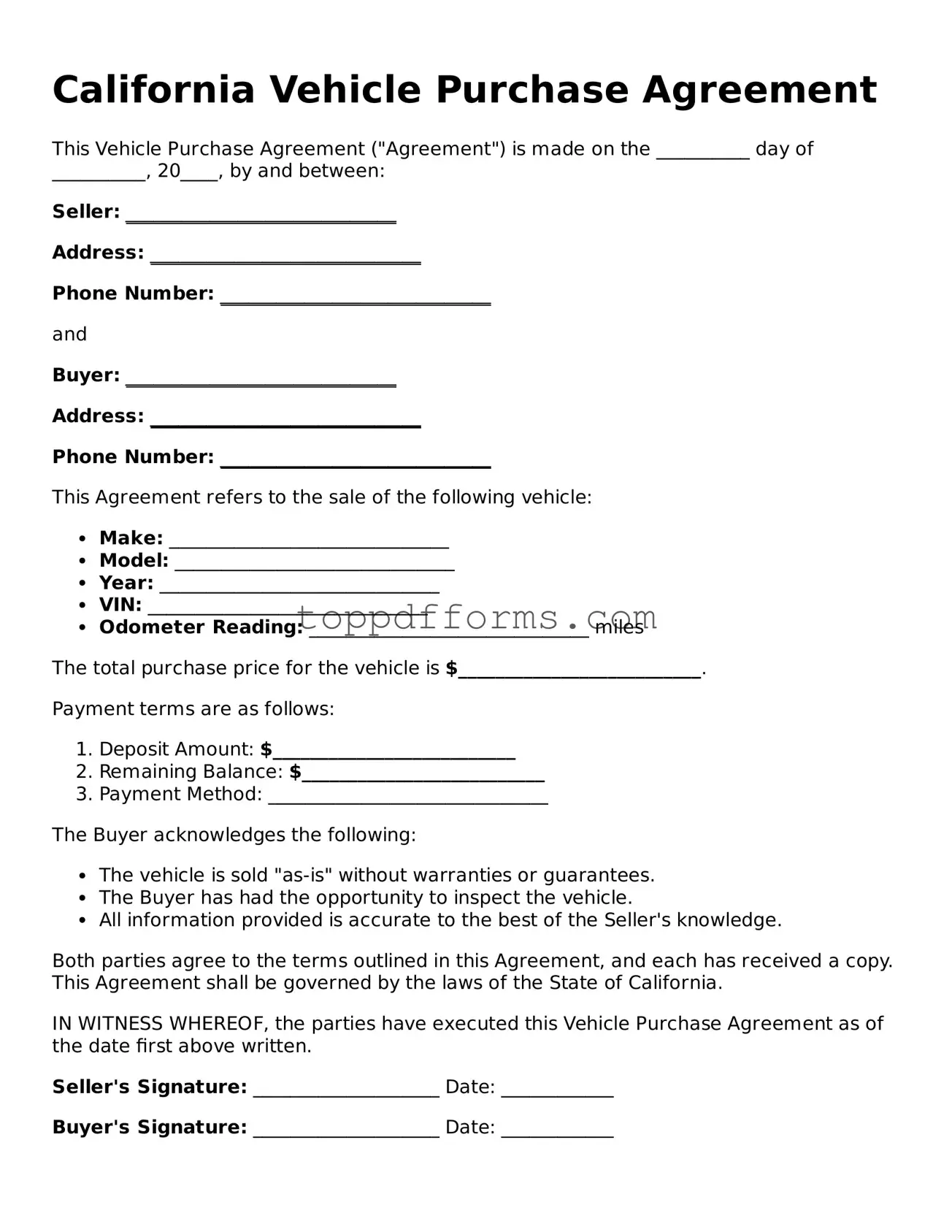Vehicle Purchase Agreement Document for California State
Things You Should Know About This Form
What is a California Vehicle Purchase Agreement?
A California Vehicle Purchase Agreement is a legal document that outlines the terms and conditions of a vehicle sale between a buyer and a seller. It includes important details such as the vehicle's make, model, year, VIN, purchase price, and payment terms. This agreement helps protect both parties by clearly stating their rights and obligations during the transaction.
Do I need a Vehicle Purchase Agreement when buying a car in California?
Yes, having a Vehicle Purchase Agreement is highly recommended when buying a car in California. This document provides a clear record of the transaction, which can be useful in case of disputes or misunderstandings later on. It ensures that both the buyer and seller are on the same page regarding the sale, making the process smoother and more transparent.
What should I include in the Vehicle Purchase Agreement?
Your Vehicle Purchase Agreement should include several key elements. Start with the buyer's and seller's names and contact information. Then, include details about the vehicle, such as the make, model, year, and Vehicle Identification Number (VIN). Don’t forget to specify the purchase price, payment method, and any warranties or guarantees. Lastly, both parties should sign and date the agreement to make it official.
What happens if the seller doesn’t fulfill their part of the agreement?
If the seller fails to meet the terms outlined in the Vehicle Purchase Agreement, the buyer may have legal options available. This could include seeking a refund, demanding the vehicle, or even pursuing legal action for breach of contract. It's important to keep a copy of the agreement and any communication related to the sale, as this documentation can support your case if needed.
Can I modify the Vehicle Purchase Agreement after it’s signed?
Once the Vehicle Purchase Agreement is signed, it is generally considered a binding contract. However, if both parties agree to changes, they can modify the agreement. It’s best to document any changes in writing and have both parties sign off on the modifications. This helps prevent confusion and ensures that everyone is aware of the new terms.
PDF Overview
| Fact Name | Details |
|---|---|
| Purpose | The California Vehicle Purchase Agreement form outlines the terms of sale between a buyer and a seller for a vehicle. |
| Governing Law | This agreement is governed by California state law, specifically the California Civil Code. |
| Key Components | It includes information such as buyer and seller details, vehicle description, purchase price, and payment terms. |
| Signatures Required | Both the buyer and seller must sign the agreement to make it legally binding. |
| Additional Documentation | It may require additional documents, such as the vehicle title and any warranties or disclosures. |
Common mistakes
When completing the California Vehicle Purchase Agreement form, individuals often overlook critical details that can lead to complications later. One common mistake is failing to provide accurate vehicle information. This includes the Vehicle Identification Number (VIN), make, model, and year. Inaccurate details can cause issues with registration and title transfer, potentially delaying the process.
Another frequent error occurs when buyers neglect to read the terms and conditions thoroughly. The agreement outlines important aspects such as warranties, payment terms, and the buyer's rights. Skipping this step can result in misunderstandings about what is included in the sale, leading to disputes between the buyer and seller.
Additionally, many individuals forget to include all necessary signatures. Both the buyer and seller must sign the agreement for it to be legally binding. Omitting a signature can invalidate the document, creating hurdles in the transaction. It is essential to ensure that all parties involved have reviewed and signed the agreement.
Lastly, buyers often miscalculate the total cost of the vehicle. This includes not only the purchase price but also taxes, fees, and any additional costs related to financing. A lack of attention to these figures can lead to financial surprises down the line. Being thorough in this area helps avoid confusion and ensures a smoother transaction.
Other Common State-specific Vehicle Purchase Agreement Forms
Vehicle Bill of Sale Form - Buyers can use this form to confirm their commitment to purchase the vehicle.
In addition to submitting the Chick-fil-A Job Application form, applicants can enhance their chances of success by visiting resources that provide additional information and support, such as My PDF Forms, which can guide job seekers through the application process and offer helpful tips for a standout submission.
